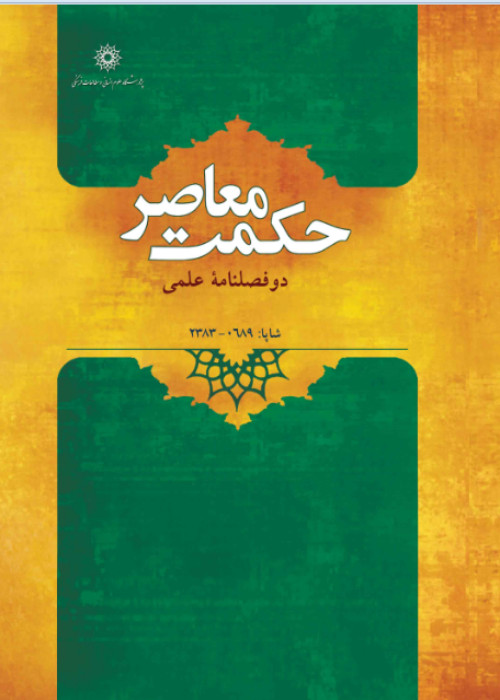The Intellect and Religion in Farabi's Philosophy
Author(s):
Abstract:
The role of the intellect (or reason) and its functions in religious speculation is very important. In the Islamic context، a wide variety of functions are attributed to the intellect. Most of the philosophical and theological schools as well as the theoretical disputes have their origin in the various status attributed to the intellect and intellection. Kindi، Avicenna، Farabi، Suhrawardi and Mulla Sadra are among the great Islamic philosophers who have postulated various functions for the intellect and speculated on its relationship with religion. Farabi particularly stands out on this topic. Farabi developed his philosophical position while the Islamic word was caught in doctrinal، juridical and theological quandaries and arguments، political differences and social upheavals، and wars between various groups claiming authority. In that period، having lost its religious principle، Islam was in a state of crisis and needed a scientific explanation for its existing challenges. Hence، people were drawn towards Greek philosophy، and its principles were used to solve problems in religious thinking. Hence، we see that Farabi، using Greek philosophy and logical deduction، strive for a better understanding of religion. He considers the general Islamic principles and the law of the revelation، a key guaranteeing happiness in this world and the next. Farabi argues that it is possible for the human intellect to understand these general Islamic principles and laws by comprehending them logically. According to him، the intellect has a universal nature، and accepting its rational proofs is a common and unalterable factual possibility for all human beings. Farabi believes that the teaching of philosophy and religion are the same. They both come from the source of revelation، or emanation of the agent intellect، and both ultimately leads to perfection and happiness. Farabi does not see any tension between religion and rational intellection and attributes a unique status to the intellect. Leaving aside his unconventional position that the philosopher has a higher status than the prophet، Farabi believes that the philosopher talks using the attributes of speech، and relying upon reason، while the prophet convinces and persuades people by means of the agent intellect imprint upon his imaginal faculty.
Language:
Persian
Published:
Journal of Hekmat e Mo'aser, Volume:2 Issue: 4, 2012
Pages:
17 to 34
magiran.com/p1187792
دانلود و مطالعه متن این مقاله با یکی از روشهای زیر امکان پذیر است:
اشتراک شخصی
با عضویت و پرداخت آنلاین حق اشتراک یکساله به مبلغ 1,390,000ريال میتوانید 70 عنوان مطلب دانلود کنید!
اشتراک سازمانی
به کتابخانه دانشگاه یا محل کار خود پیشنهاد کنید تا اشتراک سازمانی این پایگاه را برای دسترسی نامحدود همه کاربران به متن مطالب تهیه نمایند!
توجه!
- حق عضویت دریافتی صرف حمایت از نشریات عضو و نگهداری، تکمیل و توسعه مگیران میشود.
- پرداخت حق اشتراک و دانلود مقالات اجازه بازنشر آن در سایر رسانههای چاپی و دیجیتال را به کاربر نمیدهد.
دسترسی سراسری کاربران دانشگاه پیام نور!
اعضای هیئت علمی و دانشجویان دانشگاه پیام نور در سراسر کشور، در صورت ثبت نام با ایمیل دانشگاهی، تا پایان فروردین ماه 1403 به مقالات سایت دسترسی خواهند داشت!
In order to view content subscription is required
Personal subscription
Subscribe magiran.com for 70 € euros via PayPal and download 70 articles during a year.
Organization subscription
Please contact us to subscribe your university or library for unlimited access!



